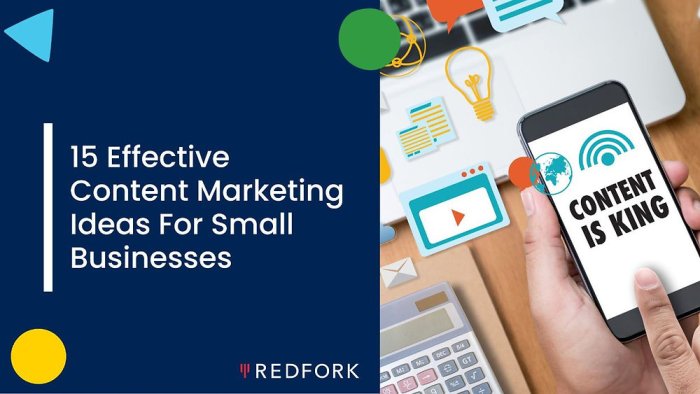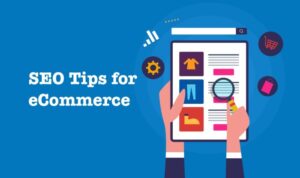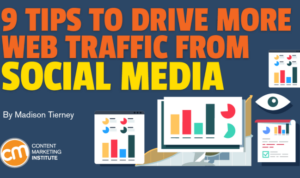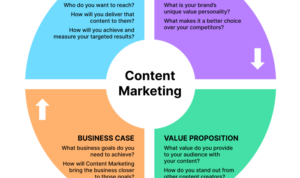Content Marketing for Small Businesses sets the stage for reaching your audience in unique ways, establishing authority, and increasing brand awareness. Dive into the world of content creation tailored for small businesses.
Importance of Content Marketing for Small Businesses
Content marketing is crucial for small businesses as it allows them to reach their target audience effectively. By creating valuable and relevant content, small businesses can attract and engage potential customers, ultimately driving sales and growth.
Establishing Authority and Credibility
Content marketing helps small businesses establish authority and credibility in their industry by showcasing their expertise and knowledge. Through blog posts, social media content, and other forms of content, small businesses can position themselves as thought leaders and gain the trust of their audience.
Increasing Brand Awareness and Customer Engagement
Content marketing plays a key role in increasing brand awareness and customer engagement for small businesses. By consistently producing high-quality content that resonates with their target audience, small businesses can boost their visibility, attract new customers, and keep existing customers engaged and loyal.
Types of Content Suitable for Small Business Marketing

Content marketing for small businesses can take many forms, each with its unique advantages in connecting with the target audience. Let’s explore some of the most effective types of content that small businesses can use to reach and engage their customers.
Blog Posts
Blog posts are a versatile tool for small businesses to share industry knowledge, company updates, and valuable information with their audience. By providing valuable content, businesses can establish themselves as industry experts and build trust with their customers. For example, a local bakery can create blog posts sharing recipes, baking tips, and stories behind their products to connect with baking enthusiasts in the community.
Videos
Videos are engaging and easily shareable content that can help small businesses showcase their products or services in action. Whether it’s a product demonstration, customer testimonial, or behind-the-scenes look at the business, videos can create a personal connection with the audience. For instance, a small boutique can create videos showing the latest fashion trends, styling tips, and interviews with designers to attract fashion-conscious consumers.
Infographics
Infographics are visually appealing and easy-to-digest content that can help small businesses convey complex information in a simple and engaging way. Small businesses can use infographics to present data, statistics, or step-by-step guides related to their products or services. For example, a local gym can create an infographic illustrating the benefits of different workout routines, nutrition tips, and fitness goals to educate and inspire their audience.
Social Media Posts, Content Marketing for Small Businesses
Social media posts are essential for small businesses to engage with their audience, build brand awareness, and drive traffic to their website. By creating engaging and relevant content for platforms like Facebook, Instagram, and Twitter, small businesses can connect with their customers in real-time and create a community around their brand. For instance, a coffee shop can share daily specials, behind-the-scenes photos, and customer testimonials on social media to attract coffee lovers and build a loyal following.
Creating a Content Marketing Strategy for Small Businesses

In today’s competitive digital landscape, having a solid content marketing strategy is crucial for small businesses to stand out and attract their target audience. Developing a tailored strategy that aligns with the unique needs and goals of a small business can help drive growth and increase brand awareness.
Identifying Target Audience and Creating Resonating Content
To create content that resonates with your target audience, small businesses should first identify who their ideal customers are. This involves conducting market research, analyzing demographics, and understanding the pain points and motivations of their audience. Once the target audience is defined, businesses can create content that speaks directly to their needs and interests. This can include informative blog posts, engaging social media content, or educational videos that provide value to the audience.
Setting Measurable Goals and Tracking Success
Setting measurable goals is essential for small businesses to track the success of their content marketing efforts. Whether the goal is to increase website traffic, generate leads, or boost sales, having clear objectives in place can help businesses stay focused and measure their progress. Utilizing tools like Google Analytics can provide valuable insights into how content is performing, allowing businesses to make data-driven decisions and optimize their strategy for better results.
Tools and Resources for Small Businesses in Content Marketing: Content Marketing For Small Businesses
In today’s digital landscape, having the right tools and resources is essential for small businesses looking to make a mark with their content marketing efforts. From content management systems to user-generated content, leveraging these resources can help businesses create engaging and effective marketing campaigns.
Essential Tools for Small Businesses
- Content Management Systems (CMS): Platforms like WordPress, Wix, or Squarespace make it easy for small businesses to create and manage their website content without the need for technical expertise.
- Social Media Scheduling Platforms: Tools like Hootsuite, Buffer, or Sprout Social allow businesses to schedule and automate their social media posts, saving time and ensuring consistent online presence.
- Analytics Tools: Google Analytics, SEMrush, or Moz provide valuable insights into the performance of content marketing campaigns, helping businesses measure success and optimize strategies.
User-Generated Content and Influencer Partnerships
User-generated content, such as customer reviews, testimonials, or social media posts, can add authenticity and credibility to a small business’s marketing efforts. Encouraging customers to create and share content can help businesses reach a wider audience and build brand trust. Additionally, forming partnerships with influencers in the industry can expose businesses to new audiences and enhance their content reach and engagement.
Resources for Small Businesses
- Online Courses: Platforms like Coursera, Udemy, or HubSpot Academy offer a variety of courses on content marketing, , and social media, helping businesses upskill and stay updated on industry trends.
- Webinars: Industry experts often conduct webinars on content marketing best practices, trends, and case studies, providing valuable insights and actionable strategies for small businesses.
- Industry Reports: Subscribing to industry reports from reputable sources like Content Marketing Institute or HubSpot can help businesses stay informed about the latest trends, benchmarks, and best practices in content marketing.





